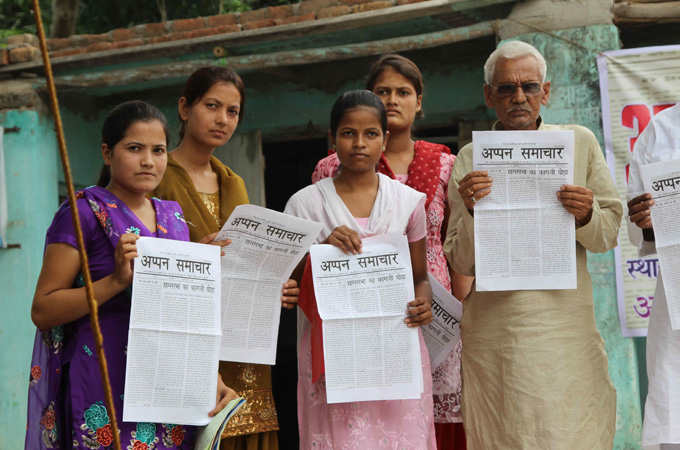मंगलवार, 29 अक्तूबर 2013
सोमवार, 28 अक्तूबर 2013
शनिवार, 12 अक्तूबर 2013
Underage brides, unrealistic dreams
An aspiring journalist shares the stories of young Indian girls forced into abusive marriages.
Viewfinder, Khushboo Kumari
Last Modified: 20 Aug 2013 13:07
Khushboo and her friends cover stories focusing on issues of women's rights in their village [Viewfinder/Al Jazeera] ------------------------------------------------------------------- |
||
| For centuries, the situation for women in India has
been poor. Ill-treatment, justified by religious and social paradigms,
is simply a way of life for many. In the 21st century, we are constantly being told about how modern we have become and how the treatment of women has supposedly improved. The reality is very different and women and girls still face innumerable problems - problems which would be unimaginable by much of the developed world. I am from Bihar State in northern India. It is one of the most backward and male-dominated states in the country and it is where almost 70 percent of child marriages occur. I grew up in Muzaffarpur district, a mainstay of commercial industries in India. For five years I have volunteered as a citizen journalist with the local news channel Appan Samachar. It means ‘Our News’. Together with my friends, we cover issues with a focus on women’s rights and screen our reports at the local market. The area I live in gives me intimate access to many stories which are often ignored by the mainstream media. Very recently I have been following the story of Shilpi Kumari, a young girl who has undergone unthinkable torture at the hands of her in-laws.
However, the groom and his older brother’s wife would often beat her if they felt she did not cook rice properly and, on some occasions, even threw scalding hot water over her. I began reporting on Shilpi’s story after I heard of an incident in which she was was tied up, gagged and left on the railway track to die by her in-laws. Somehow she managed to escape and fled to her mother’s place but her in-laws returned and took her away again. To find out more, we interviewed Shilpi’s grandfather about what happened. He was very unhappy about the situation but said that he would have preferred it if Shilpi had died on the tracks instead of returning to the family home. For him, the shame of a divorced granddaughter was too much to bear. It is hard to believe that women still live like this in the 21st century but it is not an isolated case, it is a reality for many women living in Muzaffarpur, Bihar State. Here, it is common for girls to get married in their early teens, some as young as 12. For many young brides, marriage signals the end of their childhood and any dreams they had. It is normal practice for brides to move into her husband’s family home, especially in rural areas. But for some couples this can cause tensions. Some girls are treated like ‘bonded labourers’ - a type of debt slave - by their in-laws. There are many more cases like Shipi’s. These girls believe that in such a male-dominated society they have no other option but to accept the abuse and harassment. I often wonder about the fate of these girls, I feel their pain and mourn the end of their dreams at such a young age. At Appan Samachar we have very limited resources but we wish to cover more stories like Shilpi’s in order to give a voice to these poor girls. We strongly believe that if people hear these stories they will change their attitude and even support their struggle. I hope this will happen very soon. Khushboo Kumari is a reporter and anchor for Appan Samachar ('Our News') in Muzaffarpur, Bihar State, India. Her story features in the Viewfinder Asia series, Khushboo’s Deadline. The views expressed in this article are the author’s own and do not necessarily reflect Al Jazeera’s editorial policy. Courtesy by : AlJazeera http://www.aljazeera.com/programmes/viewfinder/2013/08/2013820114819949497.html |
गुरुवार, 10 अक्तूबर 2013
रविवार, 6 अक्तूबर 2013
सदस्यता लें
संदेश (Atom)








